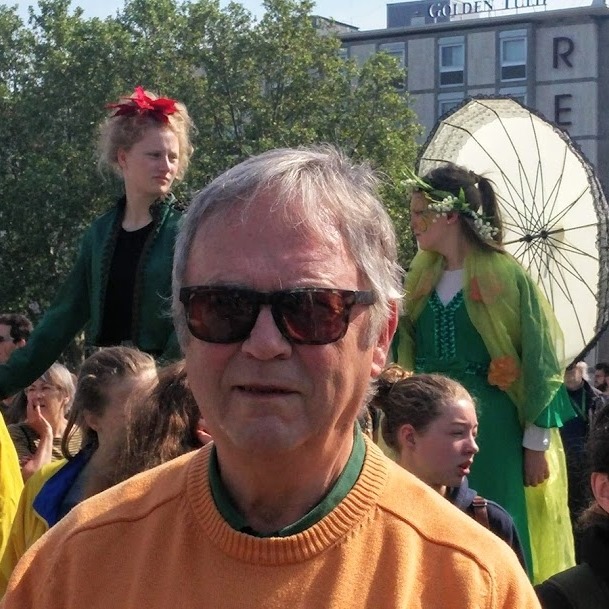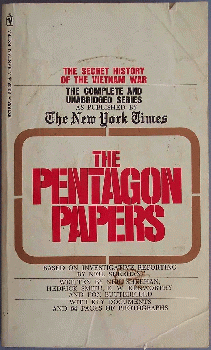Most readers of the New York Times, not only the true believers but even those who now see it as a CIA mouthpiece, would probably agree that it was a different paper in 1971 when they published the Pentagon Papers (henceforth "PP NYT"), that "epic document," according to their own self-accolade, that exposed "the secrets and lies of the Vietnam War."
The biggest secret, however, and what I call "The Second Biggest Lie" (after the Warren Report) of that era is that President Johnson continued Kennedy's Vietnam policy, when in fact he reversed it. There should never have been any controversy about this, but thanks to the NYT and a slew of academic historians who, for the first thirty years, accepted this lie, and then, for the next thirty years, engaged in a furious but spurious debate over facts that were either known (that there was a withdrawal policy under Kennedy and that Johnson reversed it) or unknowable (what JFK's "secret intentions" were and what he would have done if he had not been assassinated), instead of facing the plain facts and their implications, as Franz Schurmann, Peter Dale Scott and Reginald Zelnick did in a perspicacious little book that appeared five years before the Pentagon Papers:
...precisely at a moment when neutralist sentiment was increasing in Saigon and elsewhere, the shift from a moderate to a militant government in Saigon was accompanied by a shift in Washington's declared policy from limited to unlimited support for the Vietnam war. It is important to recall, in this regard, the stated intention of the Kennedy administration, as announced by McNamara and Taylor from the White House on October 2, 1963, which was to withdraw most U.S. forces from South Vietnam by the end of 1965. The first public indication of a change in the U.S. intentions came in a letter from President Johnson to Duong Van Minh at New Year's, 1964, which promised "the fullest measure of support...in achieving victory." The New York Times commented, "By implication, the message erased the previous date for withdrawing the bulk of United States forces from Vietnam by the end of 1965" (NYT, January 2, 1964, p. 7).
...In retrospect, it is hard to deny that, shortly before the [January 1964] coup, the United States had made the crucial decision to reverse the policy, announced during the last days of President Kennedy's administration, of gradually withdrawing U.S. troops from South Vietnam. Was it all a coincidence that a change in leadership in Washington was followed by a change in policy, and a change in policy by a corresponding change in Saigon's government? Administration officials have never yet seen fit to defend publicly this important reversal of policy; thus they have not identified the threat that brought it about. Was it a radical increase in the strength of the opposing forces? As far as we know, none has ever been alleged. Or was it a radical decline in Saigon's will to resist, with a corresponding disposition toward the political proposals of de Gaulle and the NLF [and U Thant of the UN, for a neutral or coalition government in South Vietnam]?
One conclusion can be asserted unequivocally: The United States increased its commitment to a prolongation of the Vietnam war at a time when the drift of the Saigon junta and of public opinion was in the direction of negotiations for a neutralized Vietnam. [The Politics of Escalation in Vietnam, 1966, out of print but still accessible at archive.org. Pp. 32-34. My emphasis.]
There never should have been a question whether there was a withdrawal policy or whether it was reversed. The important question, then and now (re Ukraine, Syria, Iraq, Afghanistan, etc.) is why the US feels compelled to wage war everywhere on behalf of "the free world". Schurmann et al. answer this with regard to Vietnam in the words of Robert McNamara:
A more explicit official indication of reversal of policy came in the testimony of Secretary McNamara before the Armed Services Committee, on January 27, three days before the [January 1964] coup:
The survival of an independent government in South Vietnam is so important to the security of Southeast Asia and to the free world that I can conceive of no alternative other than to take all necessary measures within our capability to prevent a Communist victory. (M. Raskin and B. Fall, The Vietnam Reader, New York, 1965, p. 394). [P. 33. My emphasis.]
Substitute "South Vietnam," "Southeast Asia" and "Communist" with terms appropriate to other US wars and you have the answer that applies to all of them: in a word, US imperialism, exceptionalism, neoconservativism - take your pick.
All we need to know about JFK's withdrawal policy and LBJ's reversal of it is in the paragraphs cited above. Why, then, has there been so much fuss about it?
To answer that question we can start with the main antagonist on one side of this spurious debate, Noam Chomsky, and as it happens, with his very first political essay, "The Responsibility of Intellectuals" (1967). In a footnote to illustrate the kind of research a citizen must undertake "to confront government pronouncements with fact," Chomsky cites this same book by Schurmann et al. to make a point that he would return to many times in later work. He calls it "Orwell's problem" (cf. Knowledge of Language: Its Nature, Origin, and Use, 1986; Manufacturing Consent, 1988): Why do we know so little when there is so much information available?
"Orwell's problem" is our problem, Chomsky is saying, if we want to know the truth amidst the barrage of government and media propaganda, reinforced by an educational system that conditions us to accept what respected authorities say as true.
How many people knew, in 1966, what Schurmann et al. (and Chomsky?) knew - that LBJ reversed JFK's withdrawal policy? Yes, it was reported in the NYT (see quote). But what political impact did this "news" have? That is the crucial question, as Chomsky, of all people, has always been fully aware.
Thus I was puzzled by his reaction to what I thought was obvious - that JFK's withdrawal plan was based on the assumption (rather than the condition, as Chomsky insists) of military success. What I was saying, Chomsky wrote in a letter to me on Jan. 7, 1993 (my letters and summaries of his are here),
Next Page 1 | 2 | 3 | 4 | 5 | 6
(Note: You can view every article as one long page if you sign up as an Advocate Member, or higher).






